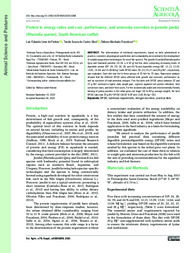Protein to energy ratios and cost, performance, and ammonia excretion in juvenile jundiá (Rhamdia quelen), South American catfish.
Protein to energy ratios and cost, performance, and ammonia excretion in juvenile jundiá (Rhamdia quelen), South American catfish.
Autoria: FREITAS, L. E. L. de; SILVA, T. S. de C.; FRACALOSSI, D. M.
Resumo: The determination of nutritional requirements, based on diets administered in practice, considers physiological specificities and sustainability are essential to the development of suitable aquaculture technologies for novel fish species. The growth of jundiá (Rhamdia quelen Quoy and Gaimard) juveniles (31.54 ± 4.92 g) fed five diets comprising increasing levels of digestible protein (DP: 24, 29, 34, 39, and 44 %) and digestible energy (DE: 12.13, 13.39, 13.81, 14.64, and 15.06 MJ kg-1) with DP:DE ratios: 20, 22, 25, 27, and 29 g MJ k-1, respectively, was evaluated. Each diet was fed to three groups of 25 fish for 75 days. Regression analysis showed that the different DP:DE ratios affected both growth and economic performance as well as excretion of total ammonia nitrogen. Fish fed diets with DP:DE ratios between 22 and 27 g MJ k-1 achieved a higher daily weight gain, superior apparent net protein utilization, feed conversion rates, and lower feed costs. For the economically viable and environmentally friendly farming of jundiá juveniles in the initial grow-out stage (30 to 80 g average weight), the best DP:DE ratio was 25 g MJ K-1 DP:DE (34.05 % DP and 13.81 MJ kg-1 DE).
Ano de publicação: 2021
Tipo de publicação: Artigo de periódico
Unidade: Embrapa Pesca e Aquicultura
Palavras-chave: Catfish, DP-DE, Excretion, Nitrogen, Nitrogênio, Nutritional adequacy, Nutrição Animal, Peixe, Rhamdia Quelen
Observações
1 - Por padrão são exibidas publicações dos últimos 20 anos. Para encontrar publicações mais antigas, configure o filtro ano de publicação, colocando o ano a partir do qual você deseja encontrar publicações. O filtro está na coluna da esquerda na busca acima.
2 - Para ler algumas publicações da Embrapa (apenas as que estão em formato ePub), é necessário ter, no celular ou computador, um desses softwares gratuitos. Sistemas Android: Google Play Livros; IOS: iBooks; Windows e Linux: software Calibre.
Acesse outras publicações
Acesse a Base de Dados da Pesquisa Agropecuária (BDPA) para consultar o acervo completo das bibliotecas da Embrapa.

